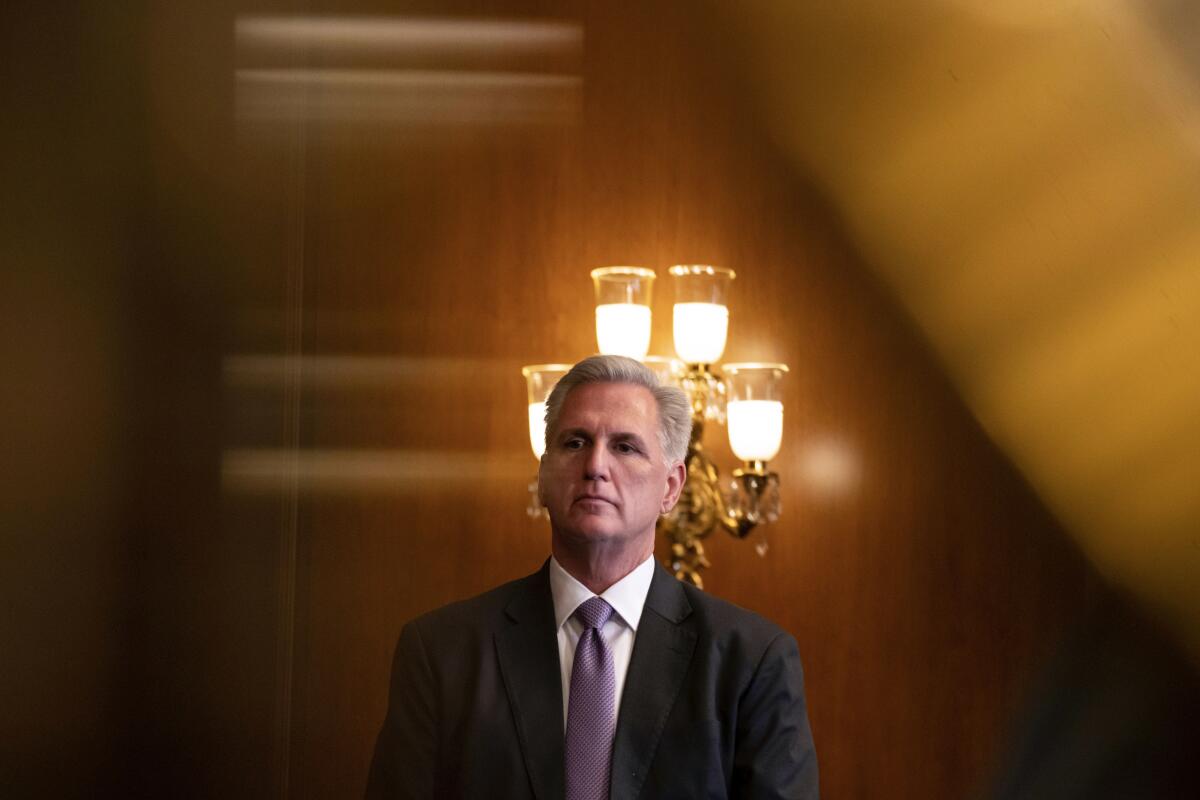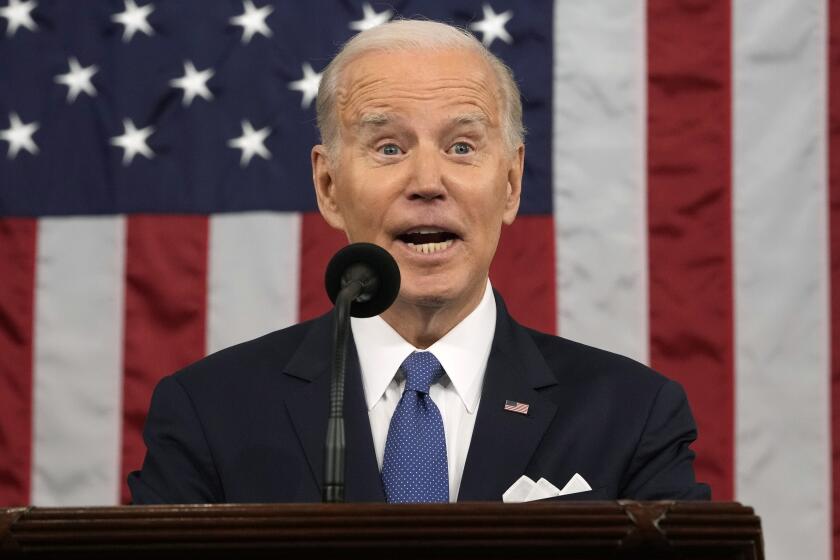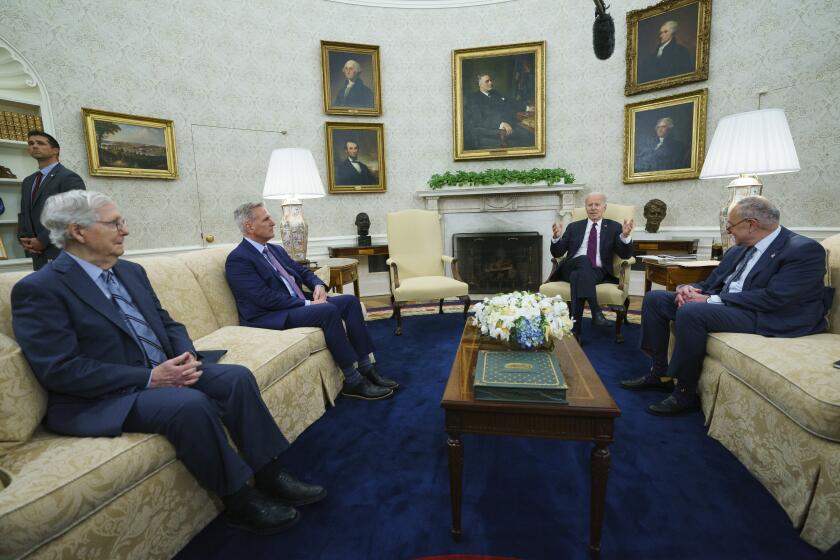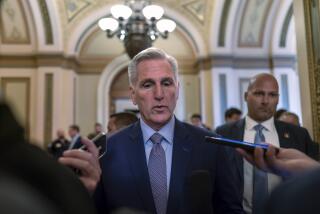Debt limit progress as Biden, McCarthy name top negotiators to avert national default

- Share via
WASHINGTON — Debt limit talks shifted into an encouraging new phase Tuesday as President Biden and House Speaker Kevin McCarthy named top emissaries to negotiate a deal to avert an unprecedented national default. Biden cut short an upcoming overseas trip in hopes of closing an agreement before a June 1 deadline.
The fresh set of negotiators means discussions are now largely narrowed to what the White House and McCarthy will accept in order to allow lawmakers to raise the debt limit in the coming days. The speaker said after a meeting with Biden and congressional leaders that a deal was “possible” by week’s end, even as — in McCarthy’s view — the two sides remained far apart for the moment.
Biden was publicly upbeat after a roughly hourlong meeting in the Oval Office, despite having to cancel the Australia and Papua New Guinea portions of his overseas trip that begins Wednesday. Biden will participate in a Group of 7 summit in Hiroshima, Japan, but then return to Washington on Sunday.
“There’s still work to do,” Biden said. “But I made it clear to the speaker and others that we’ll speak regularly over the next several days and staff’s going to continue meeting daily to make sure we do not default.”
Some legal scholars say a clause in the 14th Amendment could mean the president can bypass Congress and clear the way for more debt to be issued. Others are dubious.
Senior White House officials, as well as top aides to the four congressional leaders — McCarthy (R-Bakersfield), Senate Majority Leader Charles E. Schumer (D-N.Y.), Senate Minority Leader Mitch McConnell (R-Ky.) and House Minority Leader Hakeem Jeffries (D-N.Y.) — have been meeting daily.
But now, Steve Ricchetti, counselor to the president, Office of Management and Budget Director Shalanda Young and legislative affairs director Louisa Terrell will take the lead in negotiations for the Democratic side, while Rep. Garret Graves (R-La.), a key McCarthy ally who has been a point person for the speaker on debt and budget issues, will represent Republicans.
“Now we have a format, a structure,” McCarthy said as he returned to the Capitol.
Negotiators are racing to beat a deadline of June 1, which is when the Treasury Department has said the U.S. could begin defaulting on its debts for the first time and risk a financial catastrophe. The revised itinerary of Biden’s upcoming trip showed the urgency of the talks.
White House officials sought to soften the impact of the trip cancellations. National Security Council spokesman John F. Kirby noted that Biden will already have met with some of the leaders of the “Quad” nations — the purpose of the Australia leg of the visit — while in Japan, and the president is inviting Australian Prime Minister Anthony Albanese for an official state visit to Washington. The Quad countries are the U.S., Japan, India and Australia.
Still, Kirby added, “we wouldn’t even be having this discussion about the effect of the debt ceiling debate on the trip if Congress would do its job, raise the debt ceiling the way they’ve always done.”
Even as the Democratic president and the Republican speaker spar over the politics of the issue — with Biden insisting he’s not negotiating over the debt ceiling and McCarthy working to extract spending cuts against the backdrop of a potential default — various areas of possible agreement appeared to be emerging.
One outcome is clear as Washington reaches for a budget deal in the debt ceiling standoff: COVID era of spending ends.
Among the items on the table: clawing back some $30 billion in untapped COVID-19 money, imposing future budget caps, changing permit regulations to ease energy development and putting bolstered work requirements on recipients of government aid, according to those familiar with the talks.
But congressional Democrats are growing concerned about new work requirements after Biden suggested over the weekend he may be open to such changes.
The White House remains opposed to changes in requirements for recipients of Medicaid and food stamp programs, although it is more open to revisions for beneficiaries of the
Temporary Assistance for Needy Families cash program.
The idea of imposing more work requirements was “resoundingly” rejected by House Democrats at a morning caucus meeting, according to one Democrat at the private meeting and granted anonymity to discuss it.
Progressive lawmakers in particular have raised the issue. Rep. Pramila Jayapal (D-Wash.), the chair of the Congressional Progressive Caucus, said, “We want to make sure that these negotiations do not include spending cuts, do not include work requirements, things that would harm people, people in rural areas, Black, brown, Indigenous folks.”
Democratic leader Jeffries’ staff sought to assuage the concerns late Monday, while a separate group of more centrist Democrats signaled to their moderate Republican colleagues they are prepared to work something out to reach a debt ceiling deal, aides said Tuesday.
While McCarthy has complained the talks are slow-going, saying he first met with Biden more than 100 days ago, Biden has said it took McCarthy all this time to put forward his own proposal after Republicans failed to produce their own budget this year.
Compounding pressure on Washington to strike a deal, Treasury Secretary Janet L. Yellen said Monday that estimates are unchanged on the possible “X-date” when the U.S. could run out of cash.
But Yellen, in a letter to the House and Senate, left some opening for a possible time extension on a national default, stating that “the actual date Treasury exhausts extraordinary measures could be a number of days or weeks later than these estimates.”
“It is essential that Congress act as soon as possible,” Yellen said Tuesday in remarks before the
Independent Community Bankers of America. “In my assessment — and that of economists across the board — a U.S. default would generate an economic and financial catastrophe.”
Congress has just a few days when both the House and Senate are in session to pass legislation, although scheduled recesses could be canceled if more time is needed to clear whatever deal the White House reaches with McCarthy.
Congressional leaders will also need time to take the temperature of rank-and-file lawmakers on any agreement, and it’s not at all clear that the emerging contours go far enough to satisfy McCarthy’s hard-right faction in the House or would be acceptable to a sizable number of Democrats whose votes would almost certainly be needed to secure any final deal.
Republicans led by McCarthy want Biden to accept their proposal to roll back spending, cap future outlays and make other policy changes in the package passed last month by House Republicans.
McCarthy says the House is the only chamber that has taken action to raise the debt ceiling. But the House bill is almost certain to fail in the Senate, controlled by Democrats, and Biden has said he would veto it.
An increase in the debt limit would not authorize new federal spending.
It would only allow for borrowing to pay for what Congress has already approved.
More to Read
Get the L.A. Times Politics newsletter
Deeply reported insights into legislation, politics and policy from Sacramento, Washington and beyond. In your inbox three times per week.
You may occasionally receive promotional content from the Los Angeles Times.












